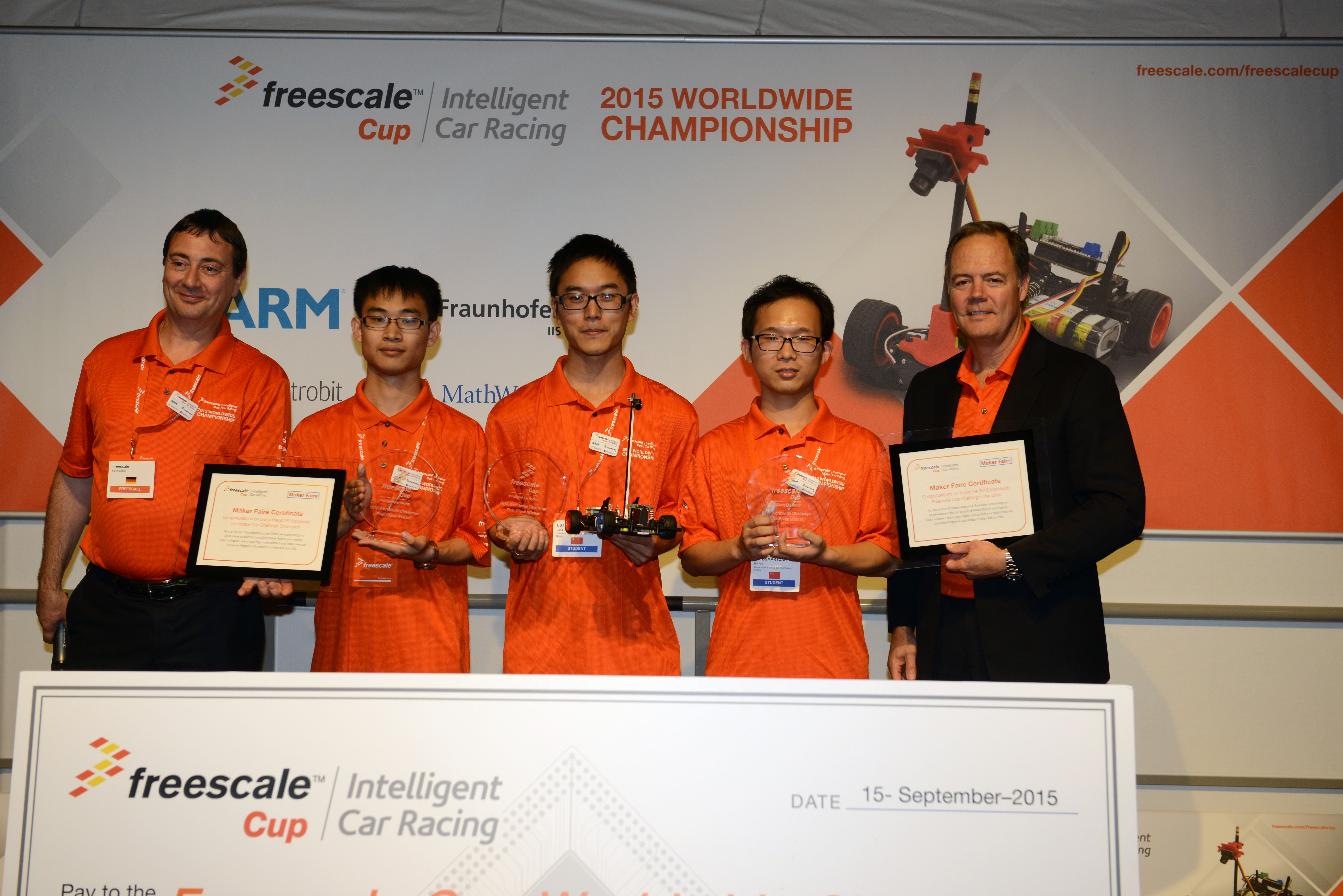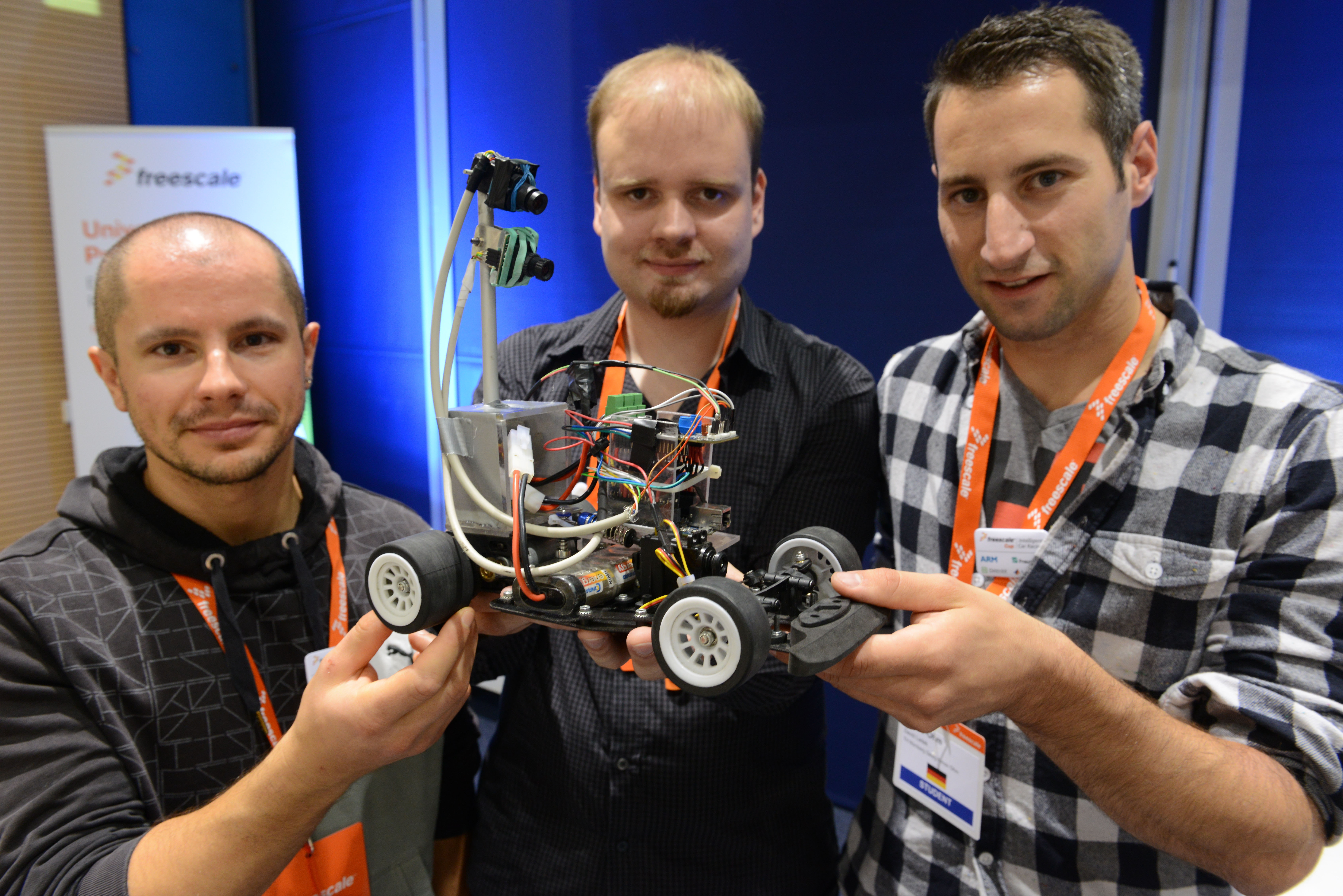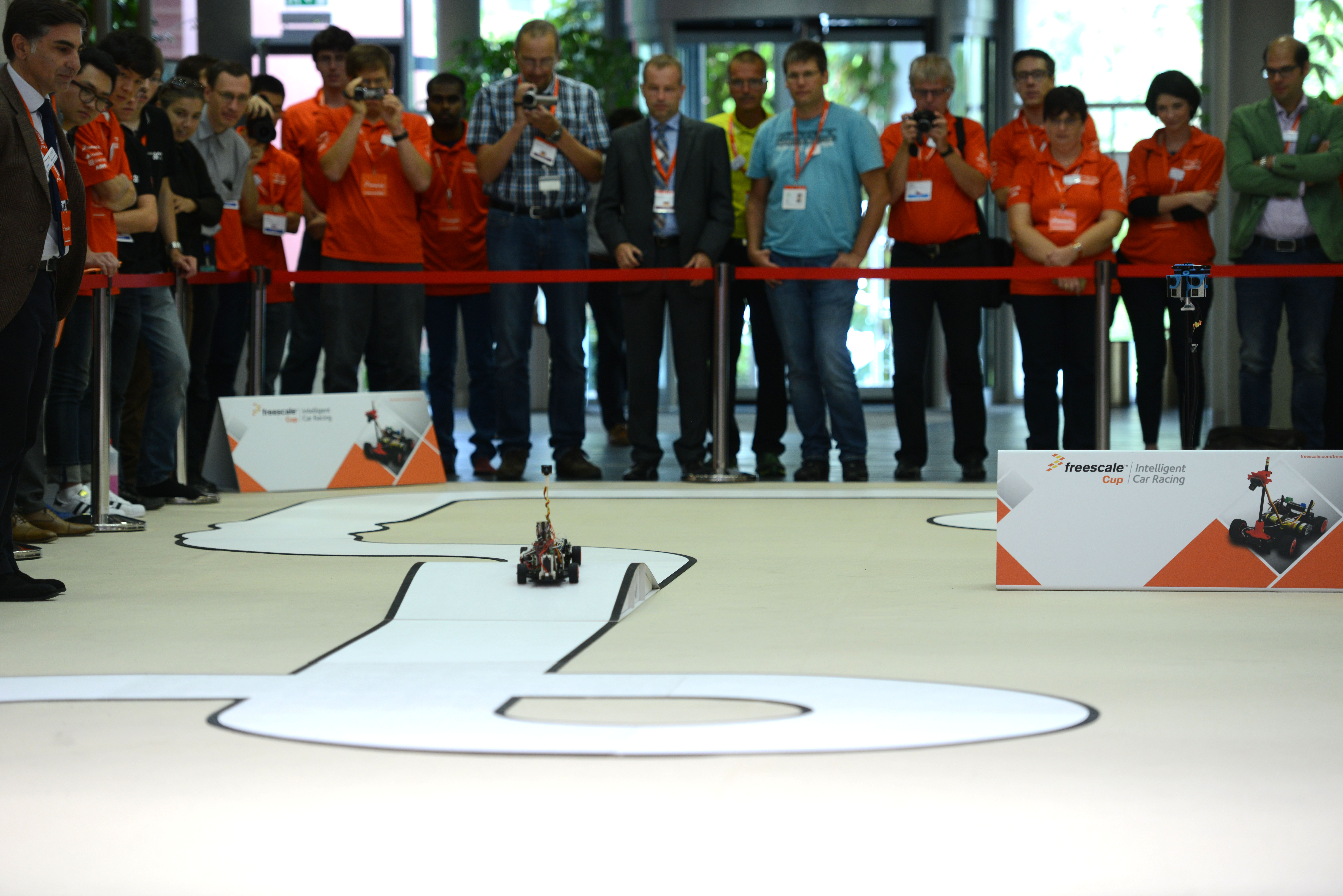The Students from the University of Science and Technology of Beijing, China, win The Freescale Cup Worldwide Challenge 2015
Young scientists from around the world have competed on September 15 at the Fraunhofer IIS to win to The Freescale Cup World Championship title.
Erlangen, Germany, 15 September, 2015 – Students from the University of Science and Technology of Beijing, China University won the Grand Final of the Freescale Cup Challenge 2015, hosted by the Fraunhofer Institute for Integrated Circuits IIS in Erlangen. They prevailed and won the race after a fierce competition that brought together the winners from regional rounds around the globe. The teams were from universities in India, Switzerland, Mexico, Brazil, North America, Malaysia, Taiwan, the Republic of South Korea and China.
The Freescale Cup, sponsored by Freescale Semiconductor, a global leader in secure, embedded processing solutions, is part of Freescale’s University Programs. The Challenge, which has been in existence for the past 13 years, has been targeting college students all across the globe. It presents them with an opportunity to experience and learn major concepts of mechanical, electrical and computing engineering technologies in a fun and competitive environment.
Student teams are challenged to build, program and race an intelligent model car around a track. The car is autonomous and must stay on the racetrack at all times. The fastest car to complete the track without going off the track wins the race. Cars are powered by powered be a Freescale 32-bit processor or microcontroller technology, which are state of the art products widely used in the industry. The cars share the same chassis basis and use similar batteries.
Twenty-five students, mentored by their faculty advisors, raced their cars on the 2015 Freescale Cup track at Fraunhofer IIS. The 180 sq/m racetrack consisted of speed bumps, intersections, hills and chicane curves.
This year, students have qualified around the world on a new racetrack where the blacklines are on the outside of the race track and no longer just a single line in the center, giving students an additional challenge in making sure their cars remain between the lines on the track.
Students have been working for the past 6 months to assemble, program and test their vehicles. They had 6 ½ hours to test and fine-tune their vehicles before the decisive race. During the training period, students had to prepare their car’s ability to avoid exiting the racetrack, quickly accelerate and brake within a given distance.
The Freescale Cup Challenge is reflecting the latest evolutions in the automotive industry, where advanced driver assistance systems are now heavily relying on processors and sensors technologies. Students had for example the ability to use up to 16 sensors, such as camera, accelerometers, gyroscope to make sure their car stays on the track.
For the final, each car had to run at high speed around the track. Each team had a maximum of 3 attempts to record a lap time during which, the first successful lap run qualified as the recorded time.
The team USTBSMARTCAR from University of Science and Technology of Beijing, China, won the competition, finishing just ahead of team Swinburne, from the Faculty of Engineering, Computing & Science, Swinburne University of Technology, Malaysia, and team ARCar1, from Haute Ecole ARC Ingénierie, Switzerland.
“The Freescale Cup has once again demonstrated that the mix of high-end technology and passion for racing has attracted highly talented students and educators, with over 32 000 students enrolled worldwide in the competition this year. Students find the linkage to automotive and robotics applications very exciting” said Steve Wainwright, General Manager EMEA, Freescale. “The spirit of the game is that students need to demonstrate excellent hardware integration and superior programming in order to be competitive. The learning achieved during the last 6 months will support those students in successfully developing their career in engineering. The industry values highly students who have “hands-on” experience in state of the art technologies, and can demonstrate the ability to collaborate, innovate and challenge themselves”.
Prof. Albert Heuberger, Director of Fraunhofer IIS, said: “The students commitment, their team spirit and technical sophistication during the Freescale Cup World Championship 2015 have inspired me. The Freescale Cup unites and challenges students from all over the world. Being one of the world’s leading application-oriented research institutions, it has been a pleasure for us to host this unique event.”
Pictures & videos of the event are available on the Freescale Community University Site.
In addition to participating in the competition, students got the opportunity to share their work and network with their peers, faculty, Freescale engineers, industry partners and customers.
Anatomy of an Intelligent Car
The teams of up to three students each received a standard Freescale Cup car kits during 2014 and early 2015. They have been working with their school facility advisors to create the fastest smart car in their respective regions. The creation of this intelligent car requires:
- embedded software programming and basic circuit creation using Freescale parts included in the entry kit
- students can use the default hardware or create their own motor control hardware and software to propel and steer their intelligent car
- students to interface with a camera to navigate the car through the race course by following the guideline
The standard intelligent car components are the model car kit, servo, electric motors, a battery with a charger and a quick start guide. Below is a list of the specific elements by function:
- Chassis – 1/18 Scale model
- Propulsion – 7.2V DC motors (one for each rear wheel)
- Steering - servo motor
- Control system – Freescale Qorivva MPC5606B automotive controller or ARM® Cortex®- M Kinetis MCU industrial controller
- Motor control – Freescale analog board featuring MC33931 H-Bridge
- Guidance – CMOS camera
ARM®, Elektrobit Automotive and Mathworks are the 3 global sponsors present at the event. Their engagement into the Freescale Cup provide hardware and software support to the students. Fraunhofer IIS is an EMEA partner and has also been the host of the event for the 2014 EMEA Challenge.
Online resources
Final results, pictures & videos of the event are available on the Freescale Community University Site.or at https://www.facebook.com/FraunhoferIIS/photos_stream
Online lectures focusing on the Freescale Cup smart car are posted on the Freescale Community University Site and on the Freescale training site to provide further information to the students, allowing them to find hints about how to optimize their project.
The Freescale Community Forum includes students from around the world, helping each other and, with the added support from Freescale employees, providing answers to some of the more complicated questions.
- EMEA Coordination: Flavio Stiffan flavio.stiffan@freescale.com
- Freescale Communities University Programs: https://community.freescale.com/community/uvp
- Freescale University Program: www.freescale.com/universityprograms
- Freescale Cup Knowledge Center: https://community.freescale.com/docs/DOC-1284
The EMEA Freescale Cup 2015–16 season
Enrollments for the 2015–16 season will start soon with information meetings at the interested schools. Contacts are available at http://www.freescale.com/freescalecup.
About Freescale
Freescale Semiconductor [NYSE:FSL] enables secure, embedded processing solutions for the Internet of Tomorrow. Freescale’s solutions drive a more innovative and connected world, simplifying our lives and making us safer. While serving the world’s largest companies, Freescale is also committed to supporting science, technology, engineering and math (STEM) education, enabling the next generation of innovators. www.freescale.com.


